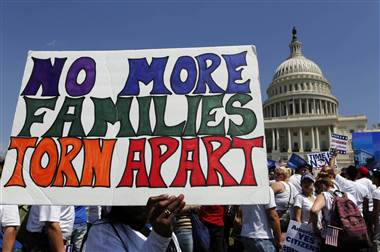When Mary resettled in the United States after leaving her African home because of war, she had to learn about the new culture. She found a job working in a nursing home, moved into an apartment and registered her son for school. She learned about American food and grocery stores, and began making friends. But Mary still faces new and unfamiliar situations in her new home.
After missing a week of work because of a sore throat and low fever, Mary decided she should see a doctor. During normal work hours, Mary went to the emergency room of the nearest hospital. While she waited, she saw many sick people come in. A man with a broken leg and a child with a severe cut both saw the doctor while she waited. Finally, Mary was taken back into an exam room. A nurse took her temperature and asked a few questions about her health before the doctor came. The doctor first asked how long she had her sore throat and fever, then examined her throat, looked in her ears and listened to her lungs. After the exam, the doctor said that Mary just had a bad cold and she didn’t need any medication. She should continue resting and drinking fluids.
Then the doctor apologized that Mary had to wait so long and said he had treated several injuries that morning. The doctor then asked Mary if she had a regular medical clinic she visited. Mary replied that when she or her son got sick, they usually went right to the hospital because they thought that was the best way to get help. But the doctor explained that there are many places people can receive medical care.
The doctor told Mary how important it is to have a regular doctor or clinic to visit. Sometimes this person or clinic is called a primary care provider. Having a primary care provider is important because they will track your illnesses, medical conditions and medications. They will treat common medical problems and illnesses and know when someone should be referred to a specialist. During the day, most illnesses or medical conditions like sore throats, stomach aches, fevers and cuts can be handled at a medical clinic.
Families with children should find a pediatrician to care for their child. A pediatrician will follow the growth of a child and track the child’s health. The pediatrician will make sure children receive the proper immunizations and exams to track their growth. School nurses can answer health questions for non-emergency conditions. The school nurse can provide health information such as the symptoms of strep throat and how to get rid of head lice.
Many hospitals and large healthcare providers have urgent care clinics. Urgent care clinics are open in the evening and on weekends to treat basic health issues that can’t wait for the morning, but are not life-threatening. These clinics treat conditions like ear infections, minor burns and cuts and sore throats when you can’t see your primary care provider.
Many health insurance companies and doctor’s offices have a nurse who can answer health care questions on the phone. The nurse can help determine whether an illness is severe and needs to be treated immediately or if the situation can be observed for a day or two.
The doctor gave Mary several suggestions on finding a primary care provider for both her and her son for future illnesses. But the doctor also explained that any life-threatening emergencies, broken bones or severe cuts should be treated in the emergency department at the hospital. Treating health issues early or in the right setting is the best way to receive the proper treatment, stay healthy and avoid high medical bills.
For information about finding a primary care provider, call your health insurance company. If you don’t have health insurance, call Portico Healthnet and the Minnesota Department of Human Services for information about free and low-cost health care programs for refugees and immigrants. Contact Portico Healthnet at 651-603-5100 or the Minnesota Department of Human Services at 651-431-2670.
CVT is a nonprofit organization whose mission is to heal the wounds of torture on individuals, their families and their communities and to stop torture worldwide. For information or referral, call 612-436-4800.
About Center for Victims of Torture
- Web |
- More Posts(5)







